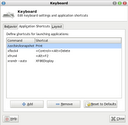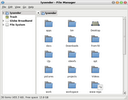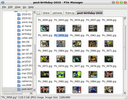I’ve been a KDE user ever since I learn Linux, from SuSE to Slackware then to OpenSuSE and back to Slackware. That was before I ever use Linux exclusively for doing work but now that I have my own computer, I got the first hand experience for Linux and KDE and finally decided to dump KDE for XFCE.
KDE Responsiveness
Before, I only got the chance to use Linux for testing during my early college days and during my first job. Now that I own a laptop and finally have the freedom to choose my OS, I get the first hand experience with Linux and the software it ships and one of the biggest is KDE.
So far, I have no much issues for KDE regarding usability. The design is sleek is great (KDE 4.4.3 currently) from desktop, to window managers / decorations, file browsers (Dolphin), to plasma desktop, widgets and panels and many others. I also like the single click to open files and directories on its file browser. Default applications that are KDE based really rocks such as image view, PDF view and many many more.
My only problem with KDE is the responsiveness / performance. If I try to launch Firefox or Opera or any other operations in KDE, it is noticeably slower than opening it on XFCE. Having several application windows open slows down window switching. Don’t forget the random crashing of KDE components.
XFCE
What I like most on KDE is that it is not just a window manager (actually the window manager for KDE is Kwin) but also it is a complete desktop environment. I will miss KDE but of course I will continue to use KDE based application such as Konsole and kppp. The closest Desktop Environment to KDE so far is Gnome. However, Slackware does not ship Gnome several years ago. Although there are Gnome projects to make Gnome run on Slackware, it still does not give me confidence on using it. So I choose XFCE as it is much closer to Gnome and KDE.
XFCE is a lightweight desktop environment that looks more like Gnome but not as huge as KDE and Gnome. XFCE can be configured to support KDE services and to use KDE based apps without issues. And most importantly, it is more responsive and faster than KDE. It also uses less memory and less CPU usage.
Although the look and feel is no match for KDE, I will get used to it. I need to disable effects for both desktop environment to make it more faster. And now I’m writing this post on OpenOffice Writer.
Walk-through
To get screen-shots, I need to configure XFCE keyboard shortcut to launch Ksnapshot to take screen-shots. Just click the mouse icon (menu launcher) → Settings → Keyboard and choose the application shortcuts tab.
I added a shortcut to PrintScreen key on the keyboard to launch ksnapshot. So this is my current desktop. Nothing fancy here.
And this is the OpenOffice Writer window where I wrote the draft for this post.
A firefox window.
Komodo Edit window.
A file browser (thunar).
Geeqie an image viewer.
Thunar showing thumbnails.
VLC, your universal player.
And the all time favorite Plant vs Zombies on wine.
So let’s look how much resource it consumes running all of them on the background.
That is almost 400MB while running all these applications with movie playing on the background!










